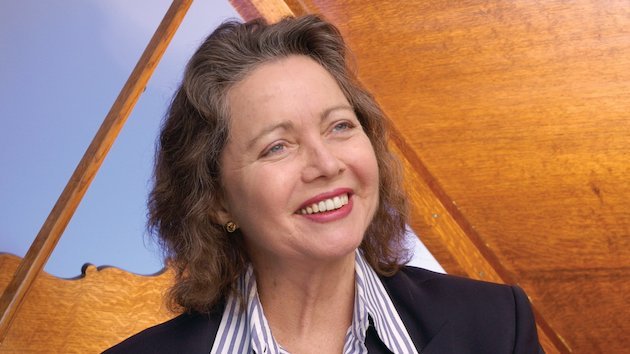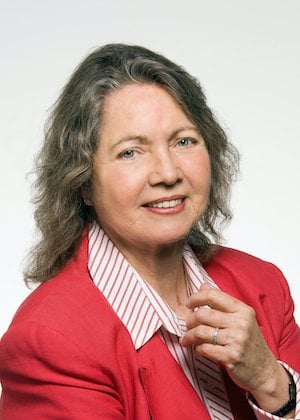
Composer Ellen Taaffe Zwilich has achieved a number of firsts in her life: In 1983, she was the first woman to receive the Pulitzer Prize in Music; in 1995, she was the first composer in residence at Carnegie Hall; and prior to snagging those honors, Zwilich was the first woman to earn a doctorate in composition at Juilliard in 1975 (with honorary doctorates including those from Oberlin College and Michigan State University). In addition, the Miami-born musician was the inaugural composer named to the Florida Artists Hall of Fame in 1994.
Zwilich, now 81, has no plans to slow down: Music Director Francesco Lecce-Chong recently named her Santa Rosa Symphony’s Artistic Partner during the second half of the orchestra’s 2020–2021 season, with the first of five concerts — all featuring Zwilich works — in a free live-streamed series, SRS@Home. Last month her Concerto Grosso for Chamber Orchestra (1985) was performed, while the upcoming Feb. 28 stream includes her Prologue and Variations for String Orchestra (1983). All concerts, which will be available on the SRS YouTube channel and the orchestra’s website, feature prerecorded introductions with Zwilich and Lecce-Chong.
An abiding presence on the music scene since participating in her high-school band before studying at Florida State University, Zwilich then moved to New York, where she spent seven years as a violinist in the American Symphony Orchestra under the esteemed conductor Leopold Stokowski, later enrolling at Juilliard and coming to prominence when Pierre Boulez programmed her Symposium for Orchestra with the Juilliard Symphony in 1975. Since then, her music has been performed, recorded, broadcast, and listened to by audiences of all stripes.
Zwilich has also been nominated for a handful of Grammys, and this year is no exception. Contemporary Voices, a recording by the Pacifica Quartet includes her Quintet for Alto Saxophone and String Quartet, with the honorees announced at the March 14 ceremony. Regarding her range, Zwilich covers the musical waterfront, having written symphonies, concertos both large and small, as well as chamber music and song cycles. In addition, her works have been premiered by, among others, Edo de Waart and the San Francisco Symphony, Sir Georg Solti and the Chicago Symphony Orchestra, and the Boston Symphony Orchestra under the baton of Seiji Ozawa.
Tim Page, describing her music in The New York Times once noted, “She writes in an idiosyncratic style that, without ostentation or gimmickry, is always recognizably hers.” I caught up with Zwilich by phone from her home in Pompano Beach, Florida. We discussed myriad topics, including her affiliation with the Santa Rosa Symphony, her composing process, and the role of women in contemporary music.
First of all, how are you faring during COVID-19?
I’m just hunkered down in Florida. Other people call it a lockdown, but it’s my normal life — being alone with my music. I miss my friends and actual interactions with people as opposed to Zoom, but I think this is a time for reflection, and I’m very impressed with certain things, for instance what the Santa Rosa Symphony is doing.
Had you known Francesco Lecce-Chong before he appointed you artistic partner, and what are your thoughts on the series?
I had no relationship with him prior to this, although I’ve had performances with the orchestra before. It’s a really nice fit and I was honored. They’re doing five different pieces of mine, which is fantastic, as I’ve had a year of cancellations — two at Carnegie Hall, one at the Kennedy Center, Lincoln Center and on and on. I hope we come through this well [because] there’s something to be gained from what people are learning about the kind of work that can be done offstage.
[For instance] if it’s nicely filmed and if the sound is good, it’s a positive thing and we’re going to end up with better ways to film concerts — not replace them, but add them to the mix. Being able to see [a performance] after the concert, and to see the conductor’s face, all of that. One of the things I’m doing is that my cello concerto, which was premiered just before lockdown last March in South Florida with Zuill Bailey [and is on SRS’s March 28 program], my idea was that three things could happen when everything suddenly goes back to normal by making a version of different concertos. It can be done as a chamber piece, as an orchestra pandemic piece with social distancing, and the other with a regular orchestra. I’m doing this with one of my piano concertos, my bassoon concerto, and my clarinet concerto.
Your previous affiliation with the Santa Rosa Symphony had something to do with Charles M. Schulz and his beloved cartoon Peanuts. He lived in Santa Rosa and discovered you through a 1990 profile on The MacNeil/Lehrer NewsHour. Later that year he included you in his comic strip. What was it like to be immortalized by one of the world’s foremost cartoonists?
Every musician I know has a Peanuts cartoon on their refrigerator and I had the shock of my life when I showed up in a Peanuts cartoon. It was that Peppermint Patty and Marcie are at a concert and Marcie says the next piece is a flute concerto by Ellen Zwilich, who happens to be a woman. In the final frame, Peppermint Patty stands on her chair and calls out, “Good going, Ellen!” Imagine how I felt when I saw this!”

It sounds incredible and resulted in your 13-minute work, Peanuts Gallery for Piano and Orchestra, a six-movement piece that was premiered in 1997 by the Orpheus Chamber Orchestra with pianist Albert Kim for a Carnegie Hall children’s concert. Can you talk about this work that will be featured on the final SRS program May 16 and was dedicated to Schulz?
I’ve always said that if I had just opened the paper and seen that, I would have died of a heart attack — and what a good way to go that would have been. I had been out of town and the first three messages were about Peanuts. I had no idea what was going on when a hip New York friend of mine told me.
[Regarding the work] you see Schroeder standing at his toy piano playing [Beethoven’s] Hammerklavier — and you’d have to be a pretty darn good pianist to play that piece, so I took off on the different characters and had fun with it. I always say, I would never write down to a child [but] I might make something short because they’re people like you and me. I had never done anything like that and when I had the first composers’ chair at Carnegie Hall in the ’90s, the CEO was Judith Arron, a brilliant administrator. She knew the difference between business and art and didn’t confuse them.
We thought it would be interesting if the first thing I did was for a family concert and I jumped into it. Charles Schulz had written me a nice note when I was working on the piece and he came to New York several times. He and [his wife] Jeannie and my late partner [violinist Joseph Zwilich] got to be very good friends. You couldn’t make up something like that.
At one point your music had been described as not living enough in the present, but looking more to tradition, while others decidedly appreciated that aspect. How would you describe your music?
It’s all kind of a mixed bag. I feel like I have a voice, but I don’t have a regular style [and] I wouldn’t want to write like somebody else. My background includes all kinds of things. I played under Stokowski for seven years and had a strong background in classical tradition. In college I played jazz and bebop, and that comes out in my music. I’m not going to sit down and say, “I’ll write something jazzy.” If it comes out that way, I’ll take it.
What do you think of today’s contemporary music scene and how did gender play a role in your career, if at all?
I like what’s going on in the music world now. Things are much, much more open and for quite some time, it’s been kind of open to women. I lucked out on the female thing. I went to a high school that had a very good band, and we had a couple of choruses and an orchestra [where] we would play a Mozart symphony. The bizarre thing for the time, which I didn’t realize then, was that we had behind-the-screen auditions.
Nobody knew if you were the freshman or the senior. If I got to be concertmaster it was because I won the audition, in spite of the fact I was a girl. Nobody ever said to me, “You can’t do it.” It was wonderful. And when I moved to New York in my early 20s [and worked with] Stokowski, we had Black people, Asians, and we had women. He didn’t have a problem with it and he liked the idea of it being open.
What is your composing process like?
There are pieces that sort of pop out and other things that take more time to get into. I always allow a lot of time because I don’t have any idea how long it’s going to take to write. Sometimes it flows out of me, other times you work to get to that point. I don’t like to do anything that’s notes on a page. I want it to come out of the whole human experience. I don’t pretend that I have a system — and I like not having one. It’s kind of fun for me when I start a piece. It makes me happy.
And after you’ve begun?

I do all my sketching on a full score. I even did that when I was hand-copying. Now I use a computer program. I want to feel the performer sitting right there looking back at me — and sometimes hearing individual voices and whose work I know well. It’s a mixed bag. I sometimes say to young composers, “Life is not like a GPS where you go three miles and make a right. It’s full of all these accidental things. It’s more like driving around in a country and stopping there and staying a few days.”
That’s how I feel about writing. I don’t want to have a road map of what I’m going to do. I want to feel it and have it just come out. We don’t know what music is, but for me, it’s the entire human, the brains, the heart, the soul, the guts. It should make you want to sing and dance. It’s sorrow and joy and everything we have as humans.




